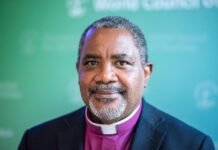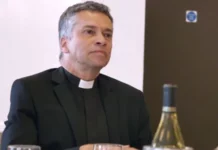Evangelicals in the Church of England have promised to ‘look closely’ at newly-published materials on sex, relationships and gender.
They say the key test for them will be whether what is set out is consistent with the teaching of the Bible. And they have pledged that, while they will encourage all evangelicals to engage and listen carefully, they will also contend ‘unflaggingly’ for ‘the faith once for all delivered to the saints’.
The comments – made by leaders of the Church of England Evangelical Council, which brings together various evangelical bishops, clergy, leaders, networks and institutions – were made after the publication of the ‘Living in Love and Faith’ resources.
The President of CEEC, the Rt Revd Julian Henderson, Bishop of Blackburn, said: “To those who have been involved in Living in Love and Faith, we offer our thanks for their time, energy, commitment and hard work. We will look closely at the materials now published and respond fully in due course. For us, this is about following Christ by submitting to what Scripture says, just as He did. So we will need to discern which of the materials in LLF do that by evaluating all of the various resources in the light of Scripture. While discussions about these issues are always welcome, the key question is not one of church procedure but whether we think that the teaching of Scripture is right. So we will engage, but this is actually about obedience to Scripture.”
He added: “To all those in the Church of England who are unsettled by suggestions that the Church might decide, in the future, to depart from historic orthodoxy, we say: ‘We are here for you. You are not alone’. We will resource you, support you and lead you. We will contend unflaggingly for the faith once for all delivered to the saints. We will uphold what Christians have always believed through history and what the overwhelming majority of Christians globally still believe. These are not matters on which we can simply agree to differ, for reasons the New Testament makes clear.”
The Chairman of CEEC, the Revd Hugh Palmer, commented: “To those in the Church of England who are calling for change, we must genuinely hear you and take the opportunity that LLF provides to be sure that we do. Yes, the way Christians have treated LGBT people is shameful, and we all want to recognise that. But we also hear the under-heard voices of countless same-sex attracted but celibate Christians whose lives bear witness to the radical way of Jesus and the New Testament, and we cannot, and will not, let them down.”
The Rt Revd Keith Sinclair, Bishop of Birkenhead, who is shortly to become CEEC’s National Director, said: “To those in society who cannot understand why we believe as we do, we gladly affirm that, like you, we all want to see people doing well, living in life-giving ways and flourishing. This isn’t about whether we want gay people or those with bisexual or other attractions to be included in the Church – we want them to be welcomed and included in all our churches. It’s about how we do that as those who want to follow the radical way of Jesus and the New Testament.”
CEEC was first created by the late Revd Dr John Stott CBE, once described by Time magazine as being among the world’s 100 most influential people. It was set up to provide a collective evangelical voice within the Church of England, was registered as a UK charity in December 1969 and incorporated in September 2003.
The term ‘evangelical’ does not refer to a style of worship but to reformed orthodox Christian beliefs such as those set out in the Church of England’s 1662 Prayer Book and 39 Articles. Literally, the word ‘evangelical’ comes from the Greek word for ‘good news’.
CEEC exists to provide for the continuing need for an overarching group to which evangelical organisations, networks, institutions and churches can belong, based on a common understanding of the Christian faith and its Anglican expression, and united by a common vision to promote and maintain orthodox evangelical theology, ethics and liturgy at the heart of the Church of England. Diocesan Evangelical Fellowships (DEFs) are the de facto representative bodies of CEEC in each diocese.
Evangelical networks which are member organisations of CEEC include New Wine, Church Society, ReNew, The Junia Network, CMS, CPAS, Crosslinks, and Fulcrum. Bishops, representatives of DEFs and Theological Colleges are also members.




” yes the way Christians have treated LGBT people is shameful, and we all want to recognise that. ” – Hugh Palmer.
That’s a very concerning concession to the narrative here. Perhaps one might say “Yes, there might be ways in which some Christians have treated LGBT people.” But what Hugh says is extremely sweeping and buying in to the ‘framing’ of the issue. Never a good idea and playing into their hands.
[…] has already been noted by a commentator on Anglican Ink, CEEC chairman, Canon Hugh Palmer, recently retired Rector of All Souls Langham Place in […]